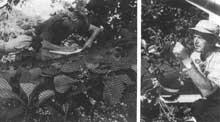About forest trees
From 15 October to 15 December last year, researchers from different states have worked shifts in the "tree network." This network stood 30-40 m above ground in the equatorial jungle of southern Cameroon.
It has collected samples of more than fifty plant species, of which approximately half had active substances.
The upper part of the forests is called canopia and in the tropical forest it fulfills the function of solar receptor, being function of the same ecosystem of the whole forest. Little known animals and plants inhabit it.

The "network on trees" is the idea of an architect, an aeronautical and an expert in tropical forest. The platform has 600 m2 and was carried with a guiding balloon.
In total, sixty researchers from twelve different states have alternated to carry out the twenty programs that contained the research. While some measured gas exchanges over the trees, others hunted bats overnight. Finally, there were also those who designated ant species.
Research on ants has been very interesting. Ants protect plants. To do this they attract sugars and plant protectors and these feed on other insects.
Researchers took a chimpanzee to nearsightedness to study the transmission of viruses and parasites caused by insect bites.
On the other hand, it was observed that about twenty species were carriers of active substances and at this time is trying to know their molecular structure.
The next nearsightedness to study will be that of northern Borneo, which will take place in early 1993.





